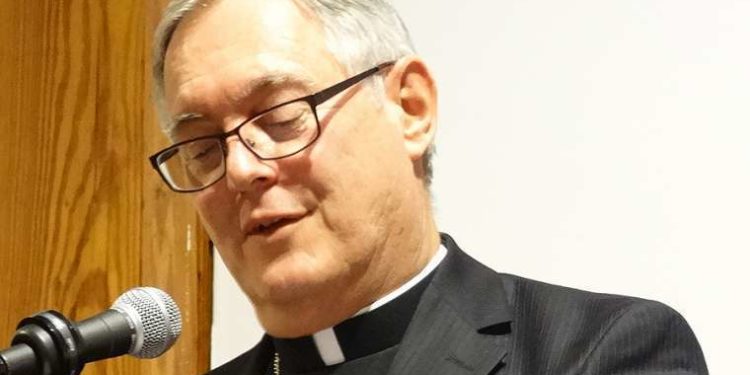by Christine Rousselle
Washington D.C., Jul 29, 2021 / 17:10 pm
The bishop of Providence says patience and reflection are necessary while bishops study Pope Francis’ motu proprio that restricted traditional liturgies.
Bishop Thomas Tobin of Providence told CNA in a phone interview this week that while he had heard rumors of liturgical changes coming from the Vatican, he was surprised when Pope Francis’ letter Traditionis custodes was released on July 16. The document, he says, is “very broad” and leaves “a lot of unanswered questions.”
The document restricted the use of traditional liturgies that preexisted the 1970 liturgical reforms. Most notably, it recognized the “exclusive competence” of bishops to authorize the Latin Mass according to the 1962 Roman Missal in their respective dioceses. It further instructed bishops to delegate locations for the Traditional Latin Mass, stipulating that the locations could not be at “parochial churches.”
Tobin said he initially found the motu proprio to be “a challenge and an opportunity.” Now, he thinks that the document was “very broad.”
“(Traditionis custodes) seemed to put all the Catholics who favor the traditional Latin Mass into one category, more or less,” said Tobin. “And there were still many questions that linger after the document.”
“I think at some point, if we get more direction, more information to answer those questions, I think it will be helpful.”
The bishop explained that he believes the pope’s letter provides an opportunity for an examination of conscience for the entire Church.
For Catholics who prefer the extraordinary form of the Roman rite, he said Pope Francis’ letter should prompt reflection on whether their preference for the Latin Mass separates them from the Church.
For Catholics who prefer the ordinary form of the Mass, Tobin said they must consider if they treat Mass “with a total respect and reverence that the Mass deserves and demands.”
“I think that a good question for people on both sides of the issue to ask is ‘what’s my attitude towards other Catholics?’” said Tobin. “And why would we be threatened by Catholics who prefer different liturgical styles?”
Tobin said that while the document was addressed to the global Church, he did not believe that the situation described in Traditionis custodes is true for everywhere in the world.
“And it does leave a lot of unanswered questions that I think we’re all grasping for,” he said.
The Diocese of Providence, the territory of which comprises the entire state of Rhode Island, is home to one parish administered by the Priestly Fraternity of St. Peter, as well as to several other locations for Latin Masses.
While the bishop himself never learned to celebrate the traditional Mass, he told CNA that one of his priorities as bishop is for the diocese to continue to respect liturgical preferences.
“At least for the time being, I don’t see any imminent threat to changing the status quo regarding the Latin Mass and the celebration of the Latin Mass in the diocese,” he said.
He said the process of implementing the motu proprio will involve writing to his priests, and asking them to explain when and where they wish to celebrate the Latin Mass.
“And that will be the beginning of a dialogue; certainly not the end of the process, but I think that’s the most beneficial aspect,” said Tobin. “And the key aspect of the Pope’s directives is it does give the bishop some oversight, some authority, over the celebration of the Mass according to the Missal of 1962.”
Tobin said that this authority is “very appropriate and very helpful” when it comes to meeting the spiritual needs of his flock.
The motu proprio, coupled with the proposed “Eucharistic revival” discussions of the U.S. bishops, provides the ideal opportunity for self-reflection for all the Catholic faithful, said Tobin.
The two issues “converge very nicely to raise up the centrality of the Eucharist, the importance of the Mass in the life of the Church,” said Tobin.
“So it is providential. I’m sure it wasn’t planned that way, but they come together very nicely,” he said. “And I hope everybody would just relax a little bit, and take in that peaceful and prayerful way.”
Tobin said that he viewed the various liturgical rites in the Catholic Church as a “mosaic.”
“A mosaic comes together beautifully to form a beautiful picture,” he said. “So I hope that’s what our liturgy throughout the Church does as well.”
Credit: Source link




